

This morning NPR's Diane Rehm had with her a collection of ten economists and financial experts of various political stripes (whenever The Nation's William Greider gets invited onto a talk show, the guest list is pretty diverse.) to discuss the current economic crisis (meltdown? disaster? circlejerk?) and what long term changes it might create for American capitalism.
Most of my life, capitalism as practiced in the USA has seemed too blood-thirsty and amoral for my tastes. It's pretty obvious that greed works, but it just seems unwise to base an economic system and the larger part of our society on a human vice! European businesses for years have complained about the outrageous and often unethical lengths USAmerican businesses will go to make money. They even speak of "American capitalism," to distinguish it from what's practiced in Europe.
Admittedly, I didn't hear all of the radio discussion this morning - just two long passages, one from each hour - but I did hear a few mentions of our system changing to become more "Asian." More like the economies of Japan and China, where there is more government intervention and control.
I couldn't contact the show to get a question in, but I wanted to ask the experts to compare USAmerican capitalism to that practiced in the so-called "Fifth World" of Scandanavia, Switzerland, and Iceland. (Okay, maybe Iceland is not a good example right now.) If we want an economy where there's freedom enough to start a business and make money BUT the government enforces the "rules of the game" to prevent unethical and foolish business practices; if we want a society where people enjoy a balance of security and freedom, with a high standard of living; then the Fifth World nations would seem a good model to follow. Certainly a better model than China.
_ __ __ ____________________ __ __ _
I'm no kind of expert, but if you don't know the term, I'll explain it the way it was explained to me. . .
Years ago, Cold War era sociologists and political scientists divided the world into First, Second, and Third World nations. First World nations had industry and capitalist economies. Second World nations had industry and communist economies. Those two groups would fight for control of the Third World nations, which had little or no industry but had natural resources. (I did tell you these were Cold War thinkers, right?)
A decade or so later, some other sociologist coined the term "Fourth World" to describe countries with some industry but where most of the wealth was controlled by a minority of the people. Dictatorships and theocracies fall into this category. I'm pretty sure I'd include Mexico too, but I can't quite decide if the USA qualifies.
Then, later still, some Swedish economist coined the term "Fifth World" to describe the economy of Sweden, where there is industrialization and "controlled capitalism," and where virtually everyone is middle class. Regulations there have made it hard to be wealthy, but they've also pretty much eliminated poverty.
To me, it all sounds like a very "Star Trek: Next Generation" place to live, but I'd prefer that to a society spawned by Winston Smith and Ralph Nickleby gang-banging Ayn Rand.
(I remember now why I stopped
writing these Thursday things:
I don't know when to shut up.)
Hits as of now: 21786

1 comment:
I don't care what anyone says: I'm proud of that last paragraph.
Post a Comment